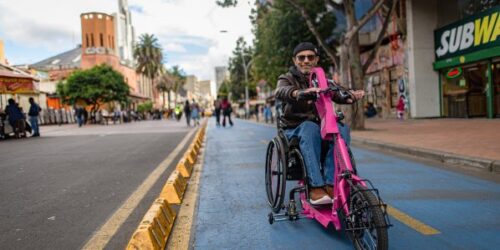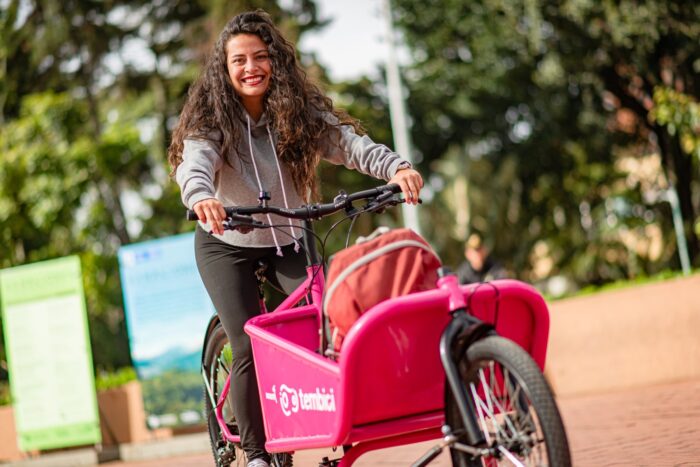Bike Sharing in Latin America: How the CFF Contributed to Bogotá’s Journey Towards Sustainable Transportation

Bike sharing systems play a pivotal role in promoting sustainable transportation within cities, especially in regions where the demand for innovative mobility options is pressing. Some Latin American countries have witnessed a significant surge in the popularity of biking as a viable transportation method, making bike sharing systems all the more appealing.
The city of Bogotá, Colombia, in collaboration with the C40 Cities Finance Facility (CFF), has established an extensive bike sharing system, covering an impressive area of 27 square kilometers with 3,000 bikes. This groundbreaking project serves as the initial phase of a larger national cluster encompassing the cities of Bogotá, Bucaramanga, Montería, and Cali, with a projected monthly user base of 81,000 individuals. This initiative marks both the CFF’s first cluster project and an innovative endeavor in the region, showcasing the city’s commitment to sustainable and accessible urban mobility.
The CFF is implemented by GIZ and the C40 Cities Network and financed by USAID together with the governments of Germany, France, and the UK. It supports cities across Asia, Africa, and Latin America in preparing and unlocking finance for sustainable urban infrastructure projects. The CFF expects to have leveraged over $1 billion in climate finance by 2025 and reduced or avoided 7.5 million tons of greenhouse gas emissions by 2050.
How to Develop a Successful System
Implementing a successful bike sharing system requires a tailored approach that accounts for the unique characteristics and requirements of each city rather than simply adopting a one-size-fits-all model. The successful integration of bike sharing systems with existing public transportation is also key, meaning people can see themselves using bikes as a last-mile mode of transportation to reach their final destinations, such as education centers, health care facilities, work, and home.
When it comes to financing bike sharing systems, there are three main approaches: publicly owned and operated, publicly owned and privately operated, and privately owned and operated. Cities in Latin America have employed all three models, but recently there has been a growing preference for privately owned and operated systems, particularly driven by the rise of dockless systems. Despite bike sharing projects generally not requiring substantial funds (ranging from $900 to $3,500 per bike according to estimates by the Institute for Transportation and Development Policy), they can face challenges accessing external financing because of the small project size. An additional key concern is covering operational and maintenance costs over time, which ensures systems remain attractive and functional.
In Colombia, legal restrictions prevented Bogotá from accessing adequate sources to finance cycling projects. However, the CFF stepped in to provide valuable technical support, assisting the city in analyzing the different options of public funding for bike sharing systems and making recommendations regarding the change of rules and regulations. This support enabled the city to utilize advertising revenues as a financing source for cycling initiatives, overcoming the funding hurdles and facilitating the development of sustainable and accessible bike sharing projects. Moreover, the CFF assisted the city in creating a coherent and financeable project, with balanced risks between the city and the private operator. Through a tender, a private operator was selected and the system began operations in September 2022.

Credit: Secretaría Distrital de Movilidad de Bogotá
An Innovative and Inclusive Model
The Colombia bike sharing program’s strong equity and inclusion focus, particularly its gender equity and Leave No One Behind values, make it unique in the region. Research reveals that women’s transportation needs differ from those of men due to their societal roles, while other factors like age, disability, and ethnicity can impact their access to safe and inclusive transportation. To gain insights into gender-specific needs in urban mobility in Colombia, as well as the gender impact of improved non-motorized transport, CFF conducted a gender analysis through technical assessments and online surveys in which 54 percent of the participants were women. Additionally, each city conducted its own gender analysis. The team examined how individuals of different genders and ages utilize cycling as a mode of transportation and collaborated with women, children, and people with disabilities to design prototypes for bikes.
The outcome was an extensive document featuring over 100 gender-sensitive recommendations covering various technical aspects of the bike sharing system, including the ideal weight, size, and design of bicycles. The team also emphasized the importance of incorporating handbikes, baskets, child seats, and cargo bikes in the Bogotá project to cater to care-related journeys for women.
This project played a vital role in facilitating a transformation in how the city approaches inclusive cycling projects, making it easier to access finance for climate action initiatives. For more resources on implementing bike sharing systems and the CFF’s work with the Colombia cluster, please check out the CFF website and the resources in the CFF’s knowledge library.
This blog was originally published by Climatelinks.

Gabriela Salgado is an anthropologist, writer, and translator from South America based in Berlin, Germany. She is part of the communications team at the C40 Cities Finance Facility (CFF) in Germany. She grew up in Ecuador, where she completed a BA in Applied Linguistics and a master’s program in Social Anthropology from FLACSO Ecuador. Currently, she is pursuing a Master in Public Policy at the Hertie School of Governance in Berlin. She has worked in communications for NGOs, public institutions, the private sector, and advertising agencies in Ecuador.

